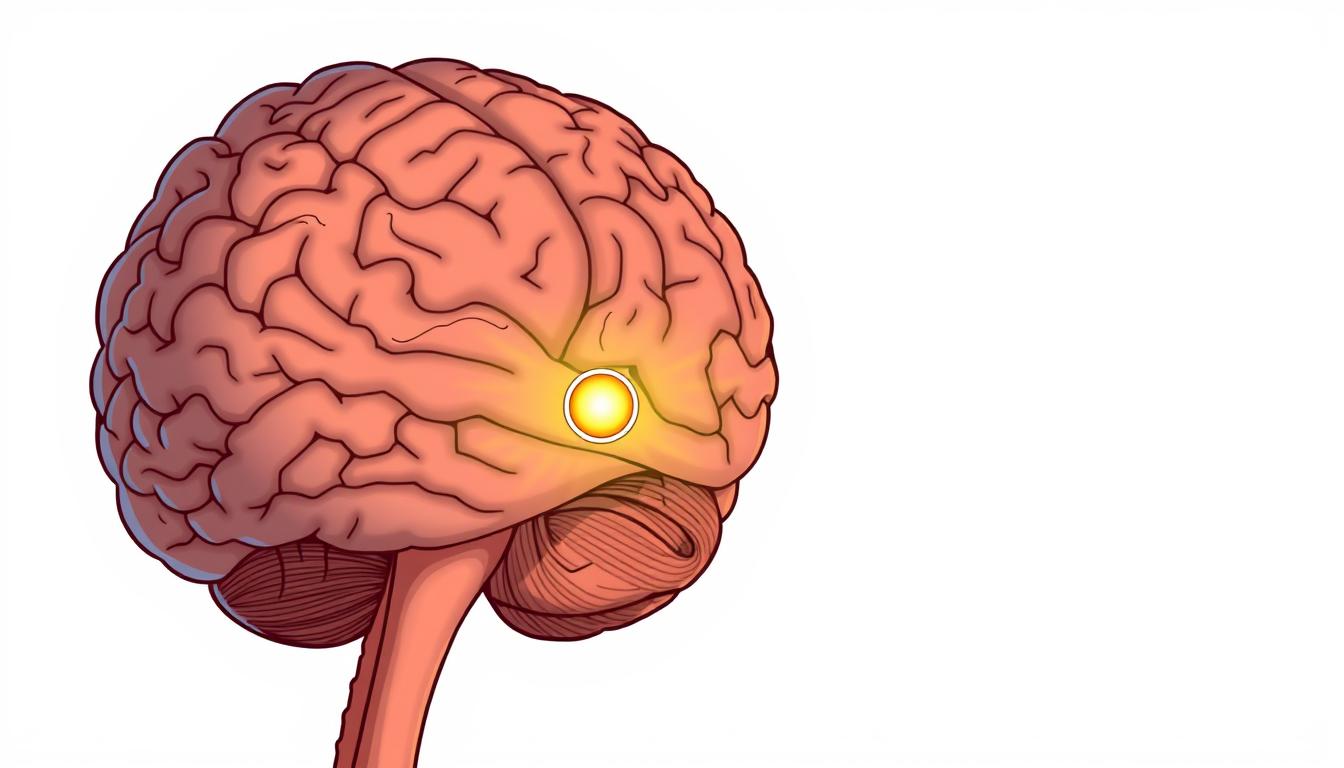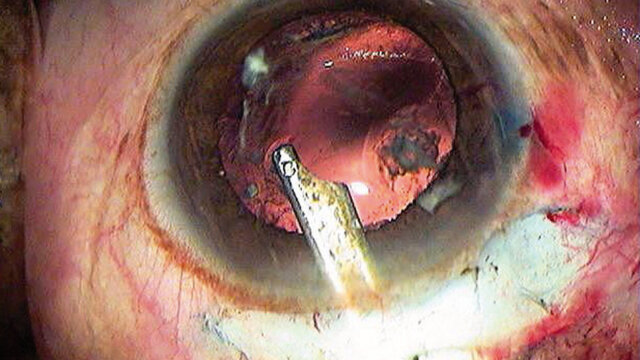FTC disclaimer: This post may contains affiliate links and we will be compensated if you click on a link and make a purchase.
Meningiomas are the most common type of tumor in the head. They affect about 3% of people over 60. These tumors grow from the membrane (meninges) that covers the brain and spinal cord. Women are more likely to get them than men.
Most meningiomas grow slowly and may not cause symptoms for years. But, they can lead to serious neurological problems if they grow in certain parts of the brain.
Key Takeaways
- Meningiomas are the most common type of brain tumor in adults, affecting about 3% of people over 60.
- These tumors are more prevalent in women and can grow slowly over many years without causing symptoms.
- Radiation exposure and certain genetic conditions increase the risk of developing a meningioma.
- Treatment options include observation, surgery, and radiation therapy, each with its own set of potential complications.
- Meningiomas can cause a wide range of neurological symptoms depending on their location in the brain.
What is a Meningioma?
A meningioma is a brain tumor that comes from the meninges. These are the protective layers around the brain and spinal cord. Most meningiomas are benign, making up 85-90% of cases. The rest are atypical or malignant.
These tumors usually happen to people aged 40 to 70. They are more common in women.
Types of Meningioma
Meningiomas come in 15 different types, as the WHO classifies them. Convexity meningiomas are the most common, making up almost 20% of cases. Other types, like Cavernous sinus meningiomas, can cause double vision and facial pain.
Skull base and spinal meningiomas are also types. They pose unique challenges because of where they are.
Meningioma Grading
Meningiomas are graded from I to III based on their growth and aggressiveness. Grade I tumors are slow-growing and low-grade. Grades II and III are more aggressive and have a higher chance of coming back.
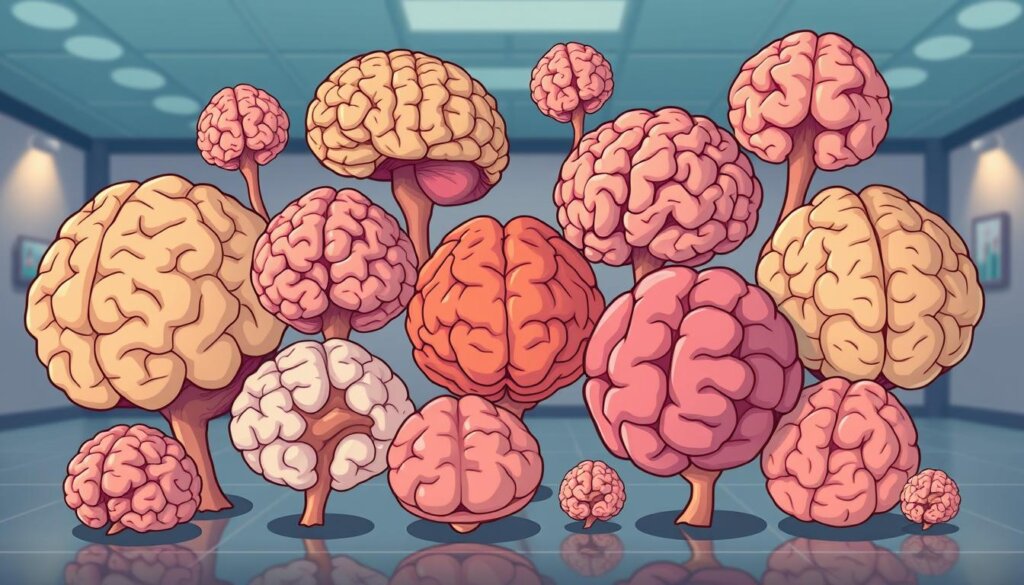
Meningiomas are complex brain tumors with many types and grades. Each type needs its own care plan. Knowing the specifics of each meningioma subtype is key to effective treatment.
Symptoms of Meningioma
Meningiomas are the most common brain tumors. They can cause different symptoms based on where and how big they are. These tumors are usually benign, making up 90% of all meningiomas. They can be cured if removed surgically. Even a small meningioma can cause symptoms as it grows and presses on nearby brain tissue or nerves.
The most common symptoms include headaches, vision changes, seizures, numbness or weakness in the arms or legs, speech difficulties, memory loss, and hearing loss. Symptoms can vary based on the meningioma’s location:
- Convexity meningioma: Personality changes, hearing loss, vertigo
- Sphenoid wing meningioma: Loss of facial sensation, blurred vision
- Suprasellar meningioma: Blurred, double or patchy vision
- Parasagittal and falcine meningioma: Problems with logic or reasoning, memory loss
- Intraventricular meningioma: Unusual feeling of pressure within the head
- Olfactory groove meningioma: Loss of sense of smell, loss of vision
- Optic nerve sheath meningioma: Gradual loss of vision, color blindness
- Posterior fossa/petrous meningioma: Loss of facial control, loss of hearing
- Spinal meningioma: Back pain, pain that radiates through the arms or legs
- Foramen magnum meningioma: Difficulty walking, loss of fine motor skills
It’s important for a doctor to carefully check a patient’s symptoms to diagnose meningioma correctly. Symptoms can start slowly and last a long time before the tumor is found. Finding and treating meningioma early can help patients get better.
Meningioma Type | Specific Symptoms |
|---|---|
Convexity meningioma | Personality changes, hearing loss, vertigo |
Sphenoid wing meningioma | Loss of facial sensation, blurred vision |
Suprasellar meningioma | Blurred, double or patchy vision |
Parasagittal and falcine meningioma | Problems with logic or reasoning, memory loss |
Intraventricular meningioma | Unusual feeling of pressure within the head |
Olfactory groove meningioma | Loss of sense of smell, loss of vision |
Optic nerve sheath meningioma | Gradual loss of vision, color blindness |
Posterior fossa/petrous meningioma | Loss of facial control, loss of hearing |
Spinal meningioma | Back pain, pain that radiates through the arms or legs |
Foramen magnum meningioma | Difficulty walking, loss of fine motor skills |
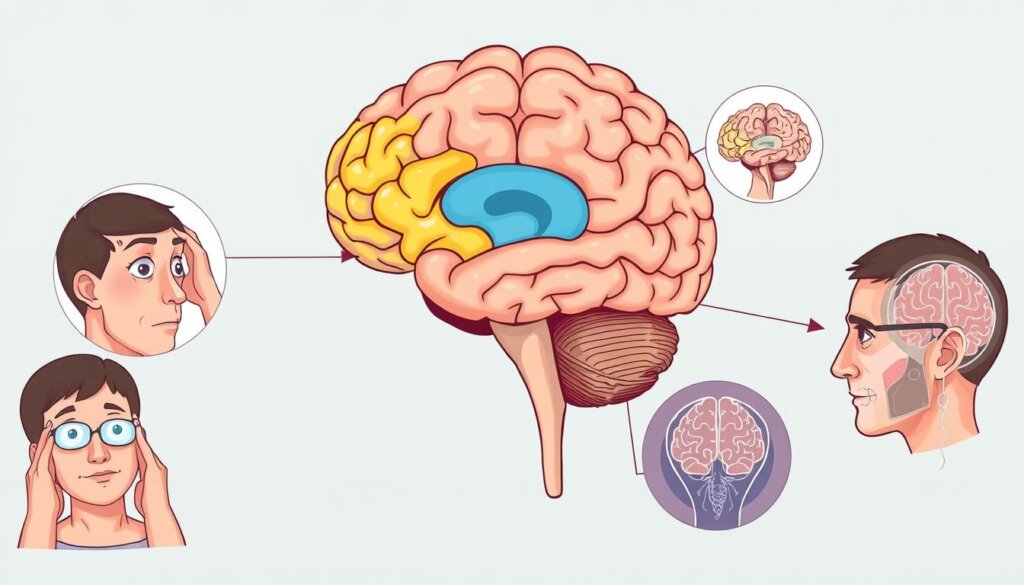
“Early recognition and treatment of meningioma can lead to better outcomes for patients.”
Causes and Risk Factors
The exact cause of meningiomas, the most common brain tumor, is still a mystery. But, researchers have found some risk factors that might help them grow.
Radiation Exposure
Getting too much radiation, like from old cancer treatments, is a big risk factor. Studies show that getting radiation can lead to meningiomas. Kids who get radiation on their heads are more likely to get these tumors 10 to 15 years later.
Genetic Predisposition
Some genetic disorders, like neurofibromatosis type 2 (NF2), raise the risk of meningiomas. Most brain tumor patients don’t have a family history. But, if they do, it might mean they’re more likely to get tumors, especially if they’re young.
Also, having allergies or epilepsy might increase the risk of getting meningiomas. Some research looked into if cell phones cause brain tumors. But, the results are still not clear.
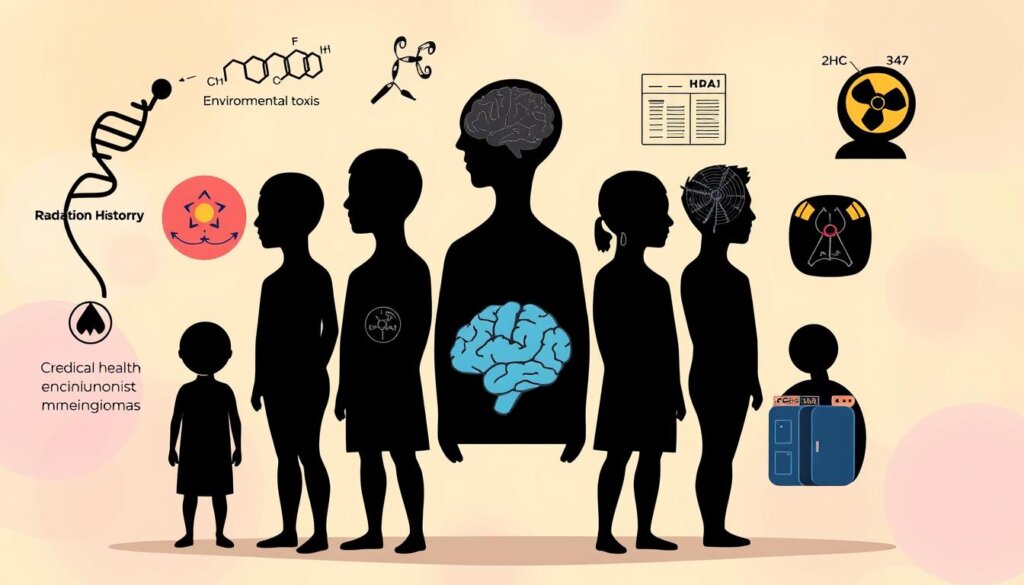
Knowing what causes meningiomas is key to finding them early and treating them well.
Diagnosis of Meningioma
Meningiomas are the most common brain tumors in the central nervous system. They are usually found through imaging tests. MRI and CT scans show detailed brain images, helping doctors spot tumors.
These tests are the first step in finding meningiomas. They grow slowly and can be mistaken for other health issues.
Doctors also do a neurological exam to check for changes in how you feel or think. Sometimes, a biopsy is needed to confirm the diagnosis and rule out other tumors. This helps doctors understand the tumor’s size, location, and growth rate for the best treatment plan.
It’s key to know that meningiomas are the most common brain tumors. But, there are rarer, more aggressive types like atypical and anaplastic meningiomas. These grow faster and are more likely to come back, needing more detailed evaluation and treatment.
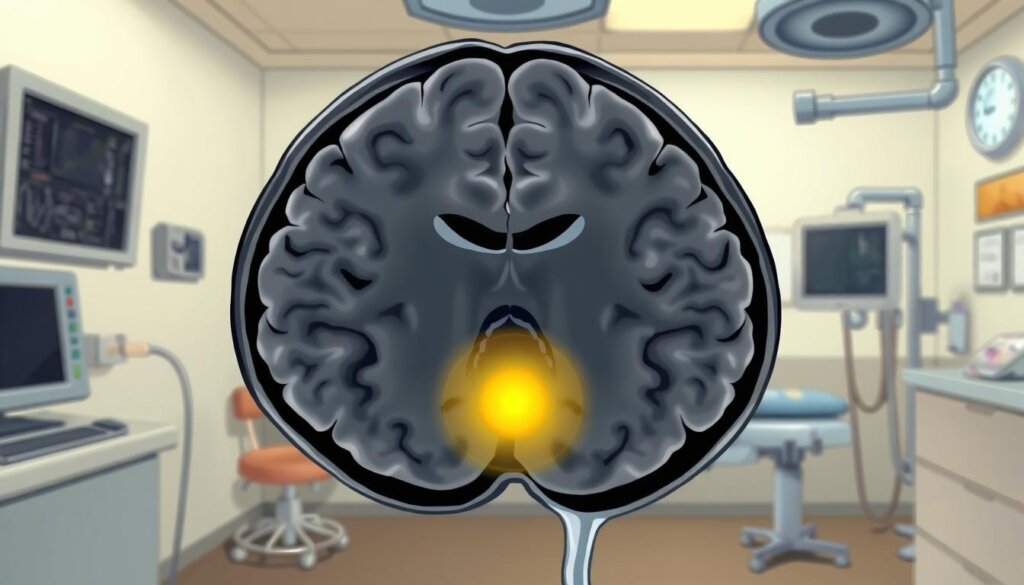
Diagnosing meningioma involves a detailed look at your medical history, a neurological exam, and advanced imaging tests. This helps doctors figure out the best way to manage the tumor and any symptoms.
Meningioma Treatment Options
Meningioma is a brain tumor that needs a treatment plan just for you. The treatment depends on the tumor’s size, location, and type. It also depends on your health and what you prefer.
Observation
For small, harmless meningiomas, watching and waiting might be the best choice. Your doctor will check the tumor often with imaging tests. This way, you avoid the risks of more serious treatments.
Surgery
Surgery is the main treatment for most meningiomas. The goal is to remove as much of the tumor as possible safely. Sometimes, the tumor’s location or size makes surgery hard or not safe.
Radiation Therapy
Radiation therapy is used alone or with surgery for aggressive or coming-back meningiomas. There are different types of radiation therapy. They aim to shrink the tumor. About 50% of patients see improvement with radiation therapy.
Your treatment plan will be made just for you. Your healthcare team will help decide the best treatment. It’s key to talk about all options with your doctor. This way, you can make a choice that’s right for you.
Complications and Side Effects
Treatment for meningioma, like surgery or radiation, has risks and side effects. It’s key for patients to know these to choose their care wisely.
Possible Complications of Meningioma Surgery
Surgery for meningioma can cause brain swelling, nerve injuries, and fluid buildup. About 20% of people might get seizures afterward, but medicine can help.
Possible Side Effects of Radiation Therapy
Radiation therapy can lead to side effects like skin reactions, tiredness, and memory changes. Hair loss happens during treatment but grows back in a few months. Fatigue is common, especially in the last weeks of treatment.
But, some effects, like memory problems, can last forever. It’s important to talk to doctors about the risks and benefits of each treatment.
“Radiation therapy is often recommended after surgery to prevent tumor recurrence, particularly if the tumor was not completely removed during surgery.”
In some cases, watching the tumor closely might be the best choice. This is for tumors that were fully removed or for older people at risk of side effects.
Meningioma and Its Impact
Meningiomas, even though they are usually not cancerous, can still greatly affect a person’s life and brain. They are the most common brain tumors, making up 37.6% of all primary central nervous system tumors in the U.S.. In 2019, it’s estimated that 33,560 cases of meningioma occurred in the U.S, with an incidence rate of 8.6 per 100,000 people. Most people are diagnosed with meningiomas when they are 66 years old, and they are more common in women than men.
A meningioma can press on important nerves and the brain, leading to serious symptoms. These symptoms can affect thinking, vision, hearing, speech, and movement. Meningiomas can greatly impact a person’s quality of life, independence, and brain function.
While many meningiomas can be treated, the effects of the tumor and its treatment can be hard to deal with. Atypical meningiomas, which make up 18% of cases, have more tissue and cell abnormalities and are more likely to come back. Also, 1.7% of meningiomas are malignant, which is a bigger threat to patients.
Things like radiation from dental X-rays and genetic disorders like NF2 can raise the risk of getting meningiomas. Hormones may also play a role in their development.
“The impact of a meningioma can be life-changing, affecting a person’s physical, cognitive, and emotional well-being. Managing the long-term effects requires a multidisciplinary approach and support from healthcare professionals and loved ones.”
It’s important to tackle the challenges meningiomas bring to ensure patients’ quality of life and brain function.
The Meningioma Experts
For meningiomas, a team of experts is key for top care. At the UCLA Brain Tumor Center, patients get quick, personal care from meningioma specialists and neurosurgeons. They are experts in treating these noncancerous brain tumors.
The center uses a multidisciplinary care approach. This means a team of doctors, including neurosurgeons and radiation oncologists, work together. They create a treatment plan that fits each patient’s needs.
This team-based method gives patients access to new treatments and clinical trials. It’s at the edge of meningioma management.
Expert | Specialty | Achievements |
|---|---|---|
Dr. Philip E. Stieg | Neurosurgeon | Named one of America’s Top Doctors each year since the designation was created nearly two decades ago. |
Dr. Theodore H. Schwartz | Neurosurgeon | Named to the lists of New York’s Super Doctors, Best Doctors in New York magazine, America’s Top Surgeons, America’s Best Doctors, and America’s Best Doctors for Cancer. |
Dr. Susan Pannullo | Neurosurgeon | One of the few neurosurgeons in the United States with access to Brainlab iX, Gamma Knife, and CyberKnife for non-invasive treatment of brain tumors and other brain conditions. |
Dr. Y. Pierre Gobin | Neurosurgeon | Internationally recognized expert with 20 years of experience in treating vascular diseases of the brain and spine, including pre-operative embolization of brain tumors. |
Dr. Jared Knopman | Neurosurgeon | Dual expertise in both open neurosurgical and minimally invasive interventional techniques, and an expert in the treatment of intracranial aneurysms and other vascular diseases of the brain and spine. |
Dr. Rohan Ramakrishna | Neurosurgeon | Employs advanced awake mapping, imaging techniques, and microsurgery to ensure maximal tumor removal and achieve the safest possible surgical outcomes for patients with brain tumors. |
Dr. John Park | Neurosurgeon | Developed a national reputation for the surgical treatment of low-grade gliomas and recurrent malignant gliomas while at the National Institutes of Health Clinical Center in Bethesda, Maryland. |
The meningioma specialists at UCLA are dedicated to the latest treatments. They include clinical trials for new therapies. Patients get top-notch, personalized care from these renowned neurosurgeons and the team.
“At UCLA, we are committed to providing the highest level of care for patients with meningiomas, utilizing the latest diagnostic and treatment techniques to achieve the best possible outcomes.”
– Dr. Rohan Ramakrishna, Neurosurgeon
Conclusion
Meningiomas are the most common brain tumors in adults. They make up over a third of all brain tumors in the U.S., with 18,000 new cases. These tumors can greatly affect a person’s life if not treated.
Most meningiomas are not cancerous. But, even the slow-growing ones can cause serious symptoms. They also might come back if not managed right.
Getting diagnosed early and getting treatment that fits you is key. The chance of getting meningioma is about 1%. But, risks can go up with things like radiation or family history.
Working with meningioma experts can help find the best treatment. This could be watching them, surgery, or radiation. This way, patients can get the best results.
The main things to know about meningiomas are early diagnosis and treatment that fits you. They are 37.6% of adult brain tumors, happening in 8.83 per 100,000 people. Quick action can really help a patient’s life and health.
By knowing more and getting care early, people can fight meningiomas. This condition is common but can be managed well.
FAQ
What is a meningioma?
Meningiomas are tumors that grow from the brain and spinal cord’s covering. They are the most common brain tumor in adults. About 85-90% are benign.
What are the different types and grades of meningiomas?
Meningiomas are divided into three grades. Grade I is slow-growing and low-grade. Grades II and III are more aggressive and can come back.
The World Health Organization (WHO) also has 15 types of meningiomas based on cell type.
What are the common symptoms of meningiomas?
Symptoms of meningioma can take a long time to show up. They depend on where the tumor is. Symptoms include headaches, blurred vision, and seizures.
Other symptoms are numbness, weakness, speech problems, memory loss, and hearing loss.
What are the known causes and risk factors for meningiomas?
The exact cause of meningiomas is not known. But some risk factors are identified. These include radiation exposure and neurofibromatosis type 2 (NF2).
Benign meningiomas are more common in women. They may grow more during pregnancy.
How are meningiomas diagnosed?
Meningiomas are diagnosed with imaging tests. These include MRI and CT scans. They show detailed images of the brain and tumors.
Many meningiomas are slow-growing. They may be found during imaging for other reasons.
What are the treatment options for meningiomas?
Treatment for meningiomas depends on the individual. It may include watching the tumor, surgery, or radiation therapy. Small, asymptomatic tumors may be watched.
Surgery is used for symptomatic or growing tumors. Radiation therapy may be used alone or with surgery, especially for aggressive tumors.
What are the potential complications and side effects of meningioma treatment?
Treatment for meningiomas has risks and complications. Surgery can cause brain swelling and nerve injuries. It can also lead to fluid buildup and damage to healthy brain tissue.
Radiation therapy can cause side effects like skin reactions and fatigue. Some side effects, like cognitive symptoms, can last forever.
How can meningiomas impact a patient’s quality of life and brain function?
Meningiomas can greatly affect a patient’s life and brain function. They can press on nerves and compress the brain. This can cause problems with thinking, vision, hearing, speech, and movement.
Why is it important to seek care from meningioma experts?
Meningiomas need care from experts, like neurosurgeons and radiation oncologists. Patients at Brigham and Women’s Hospital get prompt, personalized care from skilled neurosurgeons.
The hospital’s team works together to offer the latest treatments and innovative surgeries.
